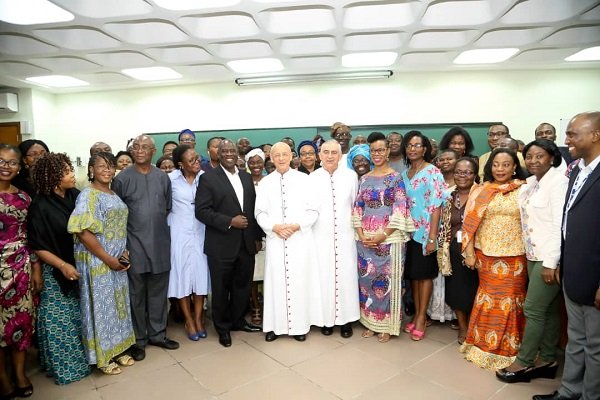How time flies! I can’t believe that five years have already passed since the Prelate of Opus Dei, Monsignor Fernando Ocariz, visited Nigeria on Thursday, July 19th, 2018. I can vividly remember that fateful day when Father Monsignor Ocariz arrived in Nigeria in the evening. Some of us were so excited to go to the airport and welcome him affectionately. The father was coming to Nigeria for the first time to be with his Nigerian sons and daughters. The excitement of spending an entire week with him in Lagos and Enugu was great. For many of us, it would be the first time we would be with him.
Some families were on hand at the airport to welcome him. From the airport, he was driven to an Opus Dei residence in Victoria Island where he would be lodging. From the following day, Friday, his goal was to meet and greet as many people as possible, both individuals and families. In the first meetings, he had with separate groups of women and then with men on July 20th, he was able to hear many lively stories. These initial meetings helped him rest and prepare for the many activities of the intense and historical week.

Throughout his stay in Nigeria, the father reiterated the message at the heart of the spirit of Opus Dei, which is to turn ordinary realities into a place of encounter with God and service to others. It is the aspiration of mature people, professionally competent and sensitive to others, seeking to make the world a more just and fraternal place. “Passionately loving the world” means knowing it, caring for it, and serving it.
The founder of Opus Dei, St. Josemaría Escrivá, summarized the approach to social needs in a letter published in the 1950s: “Christians cannot be individualists who forget about the needs of others. Nor can Christians live selfishly and turn their backs on the world; they are essentially social, responsible members of Christ’s Mystical Body.”
Monsignor Ocariz further stated, “We know that it is Jesus who bears the burden of human pain. The wounds on his side, on his hands, and on his feet are reminders of the wounds of the world. And Jesus has told us: ‘Whatever you did for one of these, you did for me.'”
“The path of identification with Christ transforms the human heart and opens it to charity. Union with the Lord, in the sacraments and in prayer, leads us to discover our neighbour and his needs and to pay less attention to ourselves. Charity changes our gaze. The charity of Christ is not merely a benevolent sentiment for our neighbour; it is not limited to a penchant for philanthropy. Poured out in our souls by God, charity transforms from within our minds and will. It provides the supernatural foundation for friendship and the joy of doing what is right. Identification with Jesus opens us to others’ needs. At the same time, contact with those in need leads us to Jesus. For this reason, St. Josemaría wrote: “A friend of ours used to say: ‘The poor are my best spiritual book and the main motive of my prayers. It pains me to see them, and in each one of them, Christ. And because it hurts, I realize I love him and love them.’” ,
Jesus had a predilection for the poor and suffering, but he also wanted to suffer need and to be a victim himself. In the suffering, we glimpse Jesus who speaks to us, as Pope Francis reminded us: “The poor, always and everywhere, evangelize us because they enable us to discover in new ways the true face of the Father.” From the time of the early Church, it has been understood that the Gospel message is based on concern for the poor and that it is a recognizable sign of Christian identity and an element in its credibility, he said.
